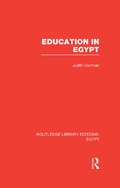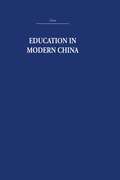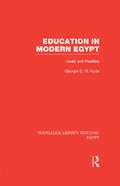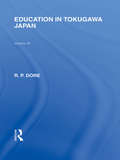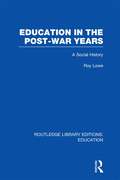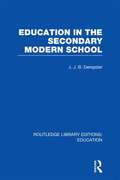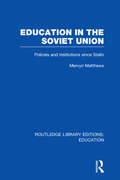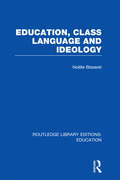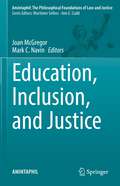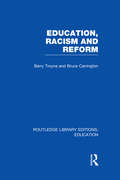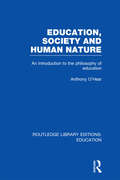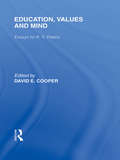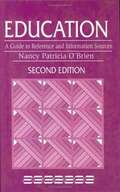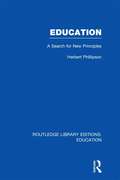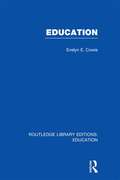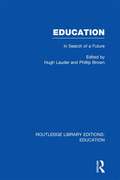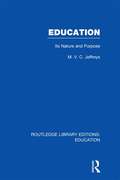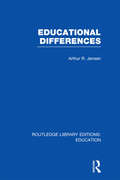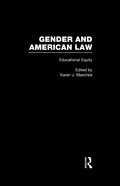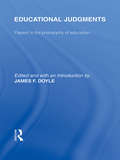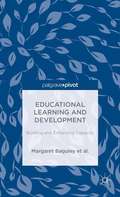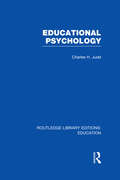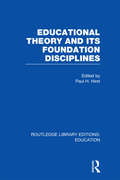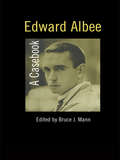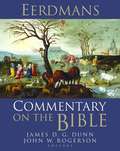- Table View
- List View
Education in Egypt: Egypt: Education In Egypt (Routledge Library Editions: Egypt)
by Judith CochranEgyptian education is a central, social and economic force in the Middle East. For hundreds of years Al Azhar University has been the centre of Islamic thinking and education. More recently Egypt became the leader in secular education as Mohammed Ali established the first medical, veterinarian, engineering and accounting schools in the Middle East. Nasser expanded Egyptian educational leadership by providing free education for Muslem students from neighbouring countries. The extensive exportation of Egyptian educators to initiate and educate in schools and universities throughout the Arab speaking world has shaped the secular and religious leaders of those countries. This book traces the history of Egyptian education over the last hundred years and highlights the key factors which have given Egyptian education its particular quality and influence within the Arab world. First published 1986.
Education in Modern China
by R.F. PriceFirst published in 1970 this re-issues the revised edition of 1979. This book examines the part played both by tradition and by the Cultural Revolution in the educational system of twentieth century China and explores the apparent reversal of policy which took place since the death of Mao. The book discusses the writings of Mao on the nature of man, society and knowledge and his ideas on education. These are then seen in the context of history, philosophy and religion. Educational aims and policies are discussed, showing how factors such as language, geography, economics and the social structure created obstacles to reform.
Education in Modern Egypt: Ideals and Realities (Routledge Library Editions: Egypt)
by Georgie D.M. HydeThis study gives a comprehensive account of the evolution of the educational system in Modern Egypt, set against the events of the last twenty five years. From the Revolution of 1952, which saw the breakdown of the party system, seen as ‘sham democracy’, to the re-adoption of the party system in 1976, the Egyptian government has searched for an ideal system that is secular, but not irreligious, and benefitting from, but not copying, the western or eastern models. Professor Hyde has analysed the problems of the educational system, administrative, institutional, theoretical and practical, and related them to Egypt’s urgent need to modernise the state, and to improve the quality of life of her hitherto deprived masses. The deficiencies of the system are discussed with emphasis on the attempts to provide solutions, mainly within the framework of reformed institutions. Informal and private education, literacy campaigns, women’s aspirations and student welfare are all considered, as are policies and plans for the immediate and long-term solutions of Egypt’s problems. The analysis also takes into account socio-economic factors in post-Revolutionary Egypt which not only constitute instruments of change in Egyptian society but also provide the restraints which prevent the rapid translation of educational ideals into reality. First published 1978.
Education in Tokugawa Japan (Routledge Library Editions: Japan)
by Ronald DoreJapanese cultural life had reached a low ebb at the beginning of the Tokugawa period. The Japanese society which emerged when Tokugawa Ieyasu had completed the process of pacifying warring baronies was neither literary, nor hardly literate. The rulers were warriors and the people they ruled were largely illiterate. The Japan of 1868 was a very different society: practically every samurai was literate and it was a world in which books abounded. The transformation which had occurred in these two and a half centuries was an essential precondition for the success of the policy which the leaders of the Meiji Restoration were to adopt. An in-depth survey of the development and education during the period, this book remains one of the key analyses of the effects of Tokugawa educators and education on modern day Japan.
Education in the Post-War Years: A Social History (Routledge Library Editions: Education)
by Roy LoweThis book provides an overview of the relationship between the sweeping social changes of the post-war period and education in England. It outlines the major demographic cultural and socio-economic developments which made new demands of the education service during the twenty years following the War and analyses the responses made by schools, colleges and universities. The book provides not only an informed narrative of the development of formal education, but also an authoritative account of the ways in which suburbanisation and the growth of the new property-owning middle class determined both the rhetoric of education and the structure of the system which emerged through the implementation of the 1944 Education Act.
Education in the Secondary Modern School (Routledge Library Editions: Education)
by J JB DempsterThe articles which make up this book, originally published in the journal The Schoolmaster were originally published at the time of The Education Act 1944 which changed the education system for secondary schools in England and Wales. This Act made secondary education free for all pupils and introduced the tripartite system of education, of which secondary modern schools were one part. This volume examines issues of low self-esteem among pupils at secondary modern schools, academic versus practical curricula, assessment and challenges for teachers – issues which are still pertinent today.
Education in the Soviet Union: Policies and Institutions Since Stalin (Routledge Library Editions: Education)
by Mervyn MatthewsThis book provides a comprehensive survey of the successes and failures of education and training in the Khrushchev and Breshnev years. The author gives an objective assessment of the accessibility of the main types of institution, of the contents of courses and of Soviet attempts to marry the functioning of their education system to their perceived economic and social needs. In addition the book has many useful and original features: For ease of analysis it summarises in diagram form complex statistics which are not usually brought together for so long a time period. It provides a systematic account of educational legislation; Matthews’ comparison of series of official decrees will allow subtle shifts in government policy to be accurately charted. Particular attention is also paid to a number of issues that are often neglected: the employment problems of school and college graduates; the role and professional status of teachers; political control and militarisation in schools; the close detail of higher education curricula; and the rate of student failure. Of special value is the chapter on those educational institutions which are often omitted from Western studies and which are hardly recognised as such in most official Soviet sources.
Education, Class Language and Ideology (Routledge Library Editions: Education)
by Noelle BisseretThis book presents an analysis of the ‘essentialist ideology’, which is inherent to class-based societies. The author argues that essentialist ideology is efficient through its unconscious component and is imposed on everyone. It guides school selection and imposes on each class a language specific in its reference to concrete domination relations. It even unbalances the scientific objectivity of researchers in the social sciences, not only among those who abide by the theory of natural aptitudes, but also among its sharpest critics, such as Basil Bernstein, Pierre Bourdieu and J C Passeron, whose work is considered in this book.
Education, Inclusion, and Justice (AMINTAPHIL: The Philosophical Foundations of Law and Justice #11)
by Mark C. Navin Joan McGregorThis book approaches education as a vital human good, both because it fosters the development of intellectual, moral and civic virtues, and because it promotes the development of valuable skills for work and for life. Accordingly, debates on justice, democracy, equality and inclusion often focus on questions concerning the kind of education people should receive, how scarce educational goods should be distributed, and the role of education in responding to historical and ongoing injustices. This volume collects 16 new essays that explore these pressing ethical, political and legal issues.
Education, Racism and Reform (Routledge Library Editions: Education)
by Barry Troyna Bruce CarringtonIn this introductory text the authors look closely at widely held assumptions about ‘race’ and schooling in Britain, and evaluate the role of the school in a multi-ethnic society. Focusing on contemporary issues and concerns, they consider such controversial questions as: Is the education system rigged against black pupils? Is ‘tolerance’ really a characteristic of the British? The volume provides a detailed analysis of the Education Reform Act (1988) and the debate surrounding the National Curriculum, and asks whether these new initiatives do truly open the doors of opportunity for all children.
Education, Society and Human Nature: An Introduction to the Philosophy of Education (Routledge Library Editions: Education)
by Anthony O'HearIntended primarily for education students this book provides an introduction to the philosophy of education that tackles educational problems and at the same time relates them to the mainstream of philosophical analysis. Among the educational topics the book discusses are the aims of education, the two cultures debate, moral education, equality as an ideal and academic elitism. It examines the limitations of a purely technological education, and suggests the shape of a balanced curriculum. It critically analyses important educational theses in the work of Rousseau, Dewey, R S Peters, P H Hirst, F R Leavis, Ronald Dworkin and G H Bantock, among many others, and considers the philosophical copics of relativism, the nature of knowledge, the basis of moral choice, the value of democracy and the status of religious claims.
Education, Values and Mind (International Library of the Philosophy of Education Volume 6): Essays for R. S. Peters
by David CooperR. S. Peters has not only been the major philosopher of education in Britain during second half of the twentieth century, but by common consent, he has transformed the subject and brought it into the mainstream of contemporary philosophy. The ten essays in this book attest to his influence whether by critical examination of his ideas or by original treatment of topics in which has has inspired a new interest.
Education: A Guide to Reference and Information Sources (2nd edition)
by Nancy Patricia O'BrienFocusing on English-language publications of the last decade, this guide identifies and describes key reference and information sources in the field of education today.
Education: A Search For New Principles (Routledge Library Editions: Education)
by Herbert PhillipsonContributing to early debates on nature versus nurture, schools and the social environment, town planning and a free comprehensive education, the author discusses key educational issues against the background of a distintegrating Europe in the midst of war.
Education: Examining the Evidence (Routledge Library Editions: Education)
by Evelyn E CowieThis volume contains both text and contemporary document which together look at the history of education from the French Revolution to the late twentieth century. The connection between text and documents is closely preserved so that the volume both explains and illustrates the important issues and problems and at the same time poses questions for students to consider or follow up.
Education: In Search of A Future (Routledge Library Editions: Education)
by Phillip Brown Hugh LauderWhat unites the contributors to this book is an opposition to Thatcherite policies on education and an agreement upon the need for the development of democracy in education. This volume highlights the importance of an area of neglected theoretical and practical concern: the development of a critique of the philosophy and policies of the new Right, and of credible alternative policies.
Education: Its Nature and Purpose (Routledge Library Editions: Education)
by M VC JeffreysThis book discusses the very nature and purpose of education and provides a foundation upon which more specialized studies in the psychology, history and sociology of education can be based. The book therefore surveys the main problems of human life – the relation of the individual and society, freedom and authority, continuity and change (i.e.growth), and underlying them all, the paradox that aspiration and frustration are continually linked in human experience. The educational implications of these various problems are considered in such a way that the methods as well as the aims of education are discussed.
Educational Differences (Routledge Library Editions: Education)
by Arthur JensenAmong particular issues discussed in this book are the problems of the cultural disadvantaged, the problems of devising psychological tests which are not biased towards any particular culture, the problems of minority groups of children in education and the relationship between heritability and teachability.
Educational Equity (Gender and American Law: The Impact of the Law on the Lives of Women)
by Karen J. MaschkeMultidisciplinary focus Surveying many disciplines, this anthology brings together an outstanding selection of scholarly articles that examine the profound impact of law on the lives of women in the United States. The themes addressed include the historical, political, and social contexts of legal issues that have affected women's struggles to obtain equal treatment under the law. The articles are drawn from journals in law, political science, history, women's studies, philosophy, and education and represent some of the most interesting writing on the subject. The law in theory and practice Many of the articles bring race, social, and economic factors into their analyses, observing, for example, that black women, poor women, and single mothers are treated by the wielders of the power of the law differently than middle class white women. Other topics covered include the evolution of women's legal status, reproduction rights, sexuality and family issues, equal employment and educational opportunities, domestic violence, pornography and sexual exploitation, hate speech, and feminist legal thought. A valuable research and classroom aid, this series provides in-depth coverage of specific legal issues and takes into account the major legal changes and policies that have had an impact on the lives of American women.
Educational Judgments (International Library of the Philosophy of Education Volume 9): Papers in the Philosophy of Education
by James F. DoyleThe topics covered in this volume, originally published in 1973, include the need for a more adequate concept or definition of education, the issue of whether indoctrination is compatible with education, particularly with moral education, and the processes of judging the merits of different approaches to aesthetic education. Two contributors present complementary analyses of the relations between freedom as a characteristic of institutions and the process of learning to be a free man. There is discussion of the neglected subject of rights and duties in education, with special emphasis on the question of a universal right to education. The volume concludes with papers on the relevance of philosophy to the practical judgments of educators and to education as a field of study.
Educational Learning and Development: Building and Enhancing Capacity
by Andy Davies Margaret Baguley Patrick Alan Danaher Linda De George-Walker Janice K. Jones Karl J. Matthews Warren Midgley Catherine H. ArdenThrough ten research projects, this book explores the topic of educational learning and development in order to examine issues that are impacting, either positively or negatively, on current research in this area. The authors explore the capacity building potential of the projects and what factors impacted on or assisted their development.
Educational Psychology (Routledge Library Editions: Education)
by Charles H JuddNo influence has more profoundly affected educational thought and practice during the late 19th and early 20th centuries than the science of psychology. This volume discusses the major differences between education prior to the influence of educational psychology and then examines the impact this had on the education of children and the experience of teachers.
Educational Theory and Its Foundation Disciplines (Routledge Library Editions: Education)
by Paul H. HirstAt the time this book was first published the disciplines of philosophy of education, educational psychology, sociology of education and the history of education had developed rapidly. The papers in this volume outline the developments that took place. The first paper analyses the nature of a theory concerned with determining practice and the place of academic disciplines within that. What emerges is the crucial role of these disciplines, but also the need to develop much more adequately a domain of practical principles, assessed and critically reformulated in the light of those disciplines. The following papers are concerned with the contributions four of those disciplines are now making.
Edward Albee: A Casebook (Casebooks on Modern Dramatists #Vol. 29)
by Bruce MannFrom the "angry young man" who wrote Who's Afraid of Virginia Woolf in 1962, determined to expose the emptiness of American experience to Tiny Alice which reveals his indebtedness to Samuel Beckett and Eugene Ionesco's Theatre of the Absurd, Edward Albee's varied work makes it difficult to label him precisely. Bruce Mann and his contributors approach Albee as an innovator in theatrical form, filling a critical gap in theatrical scholarship.
Eerdmans Commentary on the Bible
by James D. G. Dunn and John W. RogersonNo one familiar with the Bible needs to be told that it is a truly remarkable work. But it takes help to understand this ancient collection of diverse forms of literature written by different people across many centuries. The Eerdmans Commentary on the Bible (ECB) is the finest single-volume Bible handbook available. Written by world-class Bible scholars, the ECB encapsulates in nontechnical language the best of modern scholarship on the sixty-six biblical books plus the Apocrypha. The only one-volume Bible commentary to cover all the texts (even including 1 Enoch) regarded by one or more Christian churches as canonical, the ECB provides reader-friendly treatments and succinct summaries of each section of the text that will be valuable to scholars, students, and general readers alike. The primary objective of this work is to clarify the meaning of each section of the Bible. Rather than attempting a verse-by-verse analysis (virtually impossible in a one-volume work), the ECB focuses on principal units of meaning—narrative, parable, prophetic oracle, section of argument, and so on—highlighting their interconnectedness with the rest of the biblical text. The volume also addresses and answers major issues—including the range of possible interpretations—and refers readers to the best fuller discussions. Beyond providing reliable, informative commentary, this hefty volume also includes thirteen introductory and context-setting articles that do justice to the biblical documents both as historical sources and as scriptures. The sixty-seven contributors to the ECB come from a wide variety of backgrounds and are acknowledged leaders in the field of biblical studies. Their contributions stand out either for their fresh interpretations of the evidence, or for their way of asking new questions of the text, or for their new angles of approach. While the translation of choice is the New Revised Standard Version, many of the contributors offer their own vivid translations of the original Hebrew or Greek. Cutting-edge, comprehensive, and ecumenical, the ECB is both a fitting climax to the rich body of interconfessional work undertaken in the latter part of the twentieth century and a worthy launching pad for biblical study in the twenty-first.Special Features of the ECBThe only one-volume commentary to cover all the texts (including the Apocrypha and 1 Enoch) regarded by one or more Christian churches as canonicalThirteen major essays that introduce each section of Scripture and its studyEncapsulates in nontechnical language the best of modern scholarshipIncludes superb bibliographies and an extensive subject indexWritten by sixty-seven first-rate Bible scholarsDesigned for use by scholars, students, pastors, and general readers
